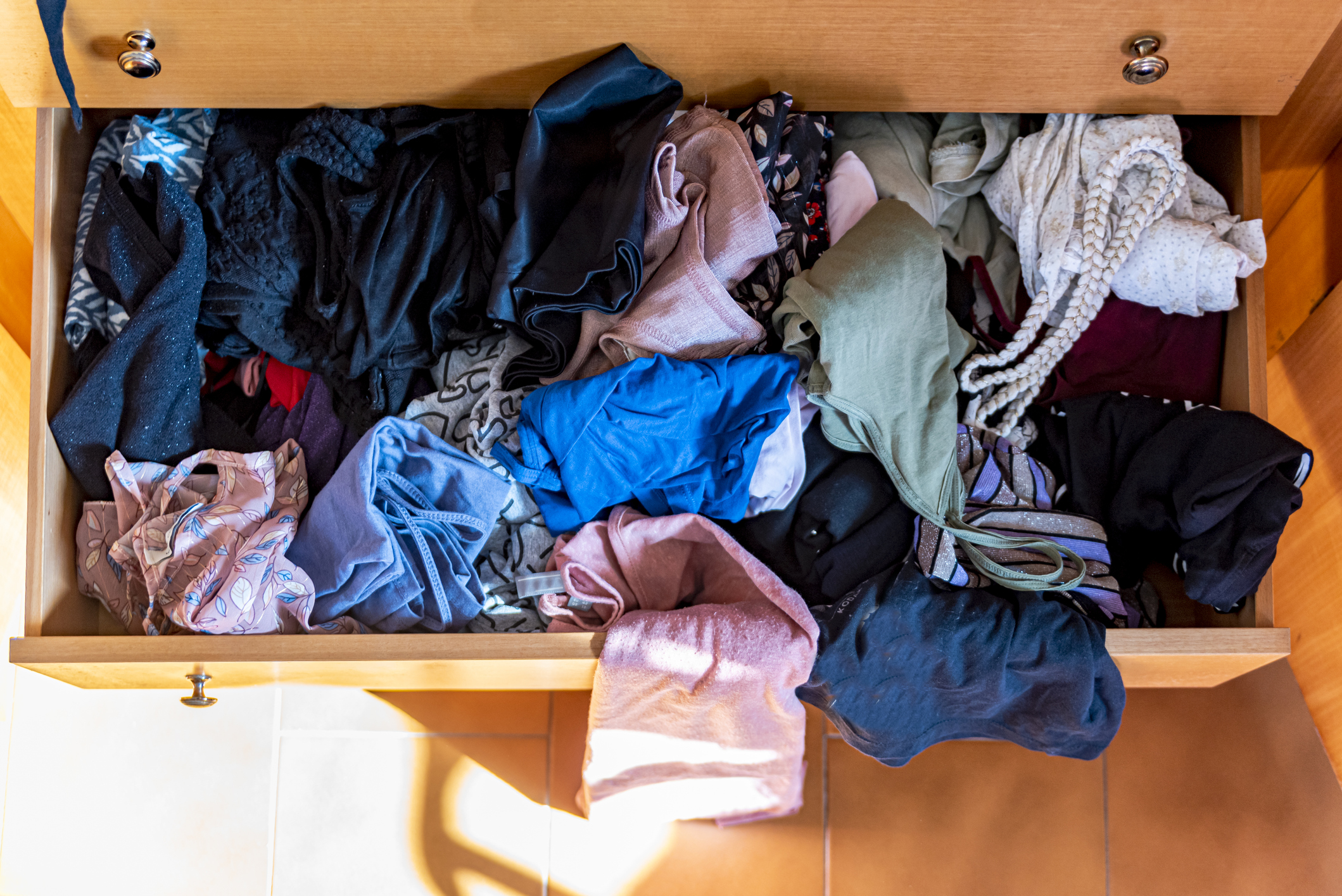9 Tips to Declutter Your Home Before Your Retirement Move
Planning to declutter your home — whether you're moving or downsizing — can be overwhelming. Here's how to do it.
Kathryn Pomroy

Profit and prosper with the best of Kiplinger's advice on investing, taxes, retirement, personal finance and much more. Delivered daily. Enter your email in the box and click Sign Me Up.
You are now subscribed
Your newsletter sign-up was successful
Want to add more newsletters?
If you're 65 or older, chances are you've called your current house "home" for a long while. It's the place where you raised your kids, welcomed grandkids, celebrated holidays and built a lifetime of memories. Besides, it's more than just walls and a roof over your head, it's the cozy backdrop filled with all those familiar sights, sounds and sentimental touches that make it truly yours.
But as the seasons change, from summer and fall to winter and then to spring, you may be changing the season of your life, too, including looking for ways to prepare your home for selling, moving or downsizing — without compromising your style.
Whether you're retiring, planning for it or still working a 9-to-5, now is the perfect time to invoke your inner Marie Kondo, the popular Japanese organization expert who famously emphasizes keeping only those items that “spark joy” in you.
From just $107.88 $24.99 for Kiplinger Personal Finance
Become a smarter, better informed investor. Subscribe from just $107.88 $24.99, plus get up to 4 Special Issues

Sign up for Kiplinger’s Free Newsletters
Profit and prosper with the best of expert advice on investing, taxes, retirement, personal finance and more - straight to your e-mail.
Profit and prosper with the best of expert advice - straight to your e-mail.
Although older people can get wrapped up in their memories and the trinkets of their past that lie stored away in every corner of the house, Kondo counsels: “Truly precious memories will never vanish even if you discard the objects associated with them. No matter how wonderful things used to be, we cannot live in the past. The joy and excitement we feel here and now are more important.”
To declutter your home, prepare to let go
Experts have made downsizing and decluttering seem simple: Keep it, trash it or donate it. If only it were that easy.
“Decluttering can seem daunting, especially for retirees and those nearing retirement who may have accumulated decades’ worth of clutter,” says Aaron Traub, owner of My Professional Organizer in New Orleans.
For anyone planning a move or just downsizing to a smaller place, the process often requires sifting through a lifetime of memories and mementos — children’s art, yellowed newspaper clippings, your late grandmother’s shawl — making the process far more complex and emotionally draining.
But it doesn’t have to be that way, especially if you consider the opportunity to offload a lot of your stuff for a fresh start.
“I always recommend that my clients focus on the idea of what they want to keep — what will support their lifestyle today, and their hopes and dreams for tomorrow, rather than the more traditional idea that we have to declutter to get rid of stuff,” says Danie Smallwood, a self-described decluttering mindset coach based in Bethesda, Md.
Whether you’re preparing for a costly move or just starting your spring cleaning, here are nine tips on how to start downsizing and decluttering.
1. Don’t try to do it all in one day
Downsizing and decluttering need to be done consistently. “Even if all you can manage is dealing with one paper from the mountain that has built up on your desk, commit to doing that one tiny thing every single day,” Smallwood says.
“Will you unclutter your whole desk that way? No. But you will create the confidence that you are someone who declutters, who sticks with it, who can keep it up — and that's the most important step you can take in the beginning.”
Whether it's 10 or 30 minutes a day, or a full day on the weekend, setting aside a dedicated time to declutter will help ensure you progress,” says Traub.

2. Start with easy wins
Gather all trash, clean out the fridge and pantry, and then collect and organize receipts and paperwork, which likely have minimal sentimental value. Next, “look for things that are out of place, like that dusty old pile of books, clothes, shoes, old technology and small appliances,” says Diane Quintana, an organizer with Release Repurpose Reorganize in Atlanta. “Can you put these things away? If you can’t put them away, can you make room for them by decluttering where they would typically go?” Better yet, donate books you've read and clothes you'll no longer wear to charity and get a break on your taxes. Keep the receipts.
Then move on to other smaller areas. Consider tackling individual drawers before moving up to something slightly larger, such as a closet or a spare room, suggests Darcy Speed, who trains other organizers and home stagers at Ultimate Academy. “There are usually fewer decisions to be made regarding what to keep and what to donate,” she says.
3. Stop collecting more stuff
Everyone likes the latest and greatest new gadgets. But sometimes you can reduce stress and make your life simpler by getting by with what you already own, even if that means telling friends and family members to skip this year’s birthday presents. “If you continue to accumulate things through the decluttering process, you’re just rearranging deck chairs on the Titanic, and you’ll be a lot slower in reaching your goals,” says Lisa Dooley, author of More Space. More Time. More Joy!: Organizing Your Best Life.
4. Consider getting outside help
Professional organizers can map out a process and timeline while keeping things moving.
“It can be helpful to have an objective outsider around when things start to get stuck,” says Melissa Gungi, a San Francisco-based professional organizer who works with retirees and seniors. “I also encourage getting help for the smaller bumps, like hiring haulers for a couple of hours to move heavy things around or take the trash out, or finding resources for where to donate and recycle things.”

5. Time to sort out your belongings
When sorting out the "clutter" you've accumulated, it's easier on your emotions to put the items into four groups — Keep, Give, Sell, Trash
Keep: It's your stuff, so it makes sense you'll want to keep everything, but that's not always best. Instead, reserve this category for items you use on a regular basis. These are the belongings you just can't do without, or don't want to do without. It may include sentimental items like family photos or your kid's trophies, canning supplies (if you actually can), legal papers like your will or house deed, and more. You get the idea.
Give: If you have special ties to certain items that are just too strong to break, consider giving them to a family member or close friend. That way, these items will be treasured in the same way you've always treasured them. You might also consider donating them to your favorite charity or to your church. Instead of clinging to the memories of the past, make room for all the new memories to come.
Trash: Trashing your belongings may be the hardest for many people. After all, these items have held a place in your home (and your heart) for years, and it's hard to part with things you may use in the future. But, ask yourself, do you want to pack all of this stuff up and move it to another home? If there are things you will never use, you can't donate, and they won’t sell, throw them away and be free!
Sell: You're keeping things you can't do without and donating things so they can be appreciated by someone else. Now it's time to earn some cash. Have a yard sale or sell your items online. Facebook Marketplace can be a great place to start. Just think of all the money that can go to a dinner out for two at your favorite restaurant before your big move.
6. Give yourself grace with a 'maybe' box
If you’re on the fence about a particular item, set it aside, suggests Smallwood, the Maryland decluttering coach. The hardest decisions will involve holiday ornaments, scrapbooks, pictures and other items that tear at your heart. “Sentimental items will slow you down, and the goal is to get through as much as you can, as quickly as you can,” she says.
When the box is full, “put a note on it and a date when you will revisit those contents,” she says. “By then, your decluttering muscles will be stronger,” and you’ll be able to make a decision.
7. Ask yourself the last time you used something
If you haven’t used it (or worn it) in the past year, and don’t expect you’ll need it soon, it's probably safe to get rid of it, says Aaron Traub, the Dallas organizer.
8. Involve your family
Reach out to your family and ask them to go through any possessions they may have left behind. Then invite family members over for a “give and take” visit, suggests Darcy Speed. “Explain that you are looking to declutter and encourage them to choose their favorite items. The "giver" can share the story behind the keepsake, making it even more meaningful, and then it can be taken out of the home.”
You may think about keeping this stuff for your heirs, but keep in mind that very rarely do your children have the same attachments to items that you have. Your kids will likely want to create their own new memories. Instead, discard the items. But before you do, “take pictures and videos to keep the memories alive,” suggests John Linden, a Los Angeles-based interior designer.
9. Declutter on a regular basis
Finally, be sure that your old habits don’t return. “Keep up with the organization,” says Linden. “Make sure to declutter on a regular basis, and be conscious of what new items you are bringing into your home.”
For Jakob Miller, in New York, “Decluttering was a challenging but rewarding task. Not only did it make my home more organized and functional, but it also gave me a sense of peace and clarity,” he says. “Just start small, take it one step at a time. And you'll be amazed at the results.”
Note: This item first appeared in Kiplinger’s Retirement Report, our popular monthly periodical that covers key concerns of affluent older Americans who are retired or preparing for retirement. Subscribe for retirement advice that’s right on the money.
Building a dream retirement shouldn’t feel like a second job. Subscribe to our free newsletter, Retirement Tips.
Related Content
Profit and prosper with the best of Kiplinger's advice on investing, taxes, retirement, personal finance and much more. Delivered daily. Enter your email in the box and click Sign Me Up.

Dawn Wotapka has worked, interned and written for Dow Jones Newswires and The Wall Street Journal, The News & Observer, Los Angeles Times and The Dallas Morning News and SmartMoney magazine. She previously covered commercial real estate for the Long Island Business News, where she won multiple awards for breaking news during what turned out to be the commercial bubble. She serves on the Board of Governors of SABEW, the Society of American Business Editors and Writers, where she has worked on the group's development, training and college visitation committees.
- Kathryn PomroyContributor
-
 4 High-End Experiences Worth the Splurge After 50
4 High-End Experiences Worth the Splurge After 50These curated date ideas provide the perfect backdrop for couples ready to enjoy the very best that the world has to offer.
-
 Health Care Stocks Have Sagged. Can You Bet on a Recovery?
Health Care Stocks Have Sagged. Can You Bet on a Recovery?The flagging health care sector has perked up a bit lately. Is it time to invest?
-
 Costco's Auto Program: Can Membership Pricing Really Save You Money on a Car?
Costco's Auto Program: Can Membership Pricing Really Save You Money on a Car?Costco's Auto Program can simplify the car-buying process with prearranged pricing and member perks. Here's what to know before you use it.
-
 4 High-End Experiences Worth the Splurge After 50
4 High-End Experiences Worth the Splurge After 50These curated date ideas provide the perfect backdrop for couples ready to enjoy the very best that the world has to offer.
-
 My Grandkids Want Me to Donate to Their Teams and School Fundraisers. I Adore Them, but I'm on a Budget.
My Grandkids Want Me to Donate to Their Teams and School Fundraisers. I Adore Them, but I'm on a Budget.When your heart says "yes" but your wallet says "no," there is still a way forward. Here's what financial pros say.
-
 Your Retirement Age Is Just a Number: Today's Retirement Goal Is 'Work Optional'
Your Retirement Age Is Just a Number: Today's Retirement Goal Is 'Work Optional'Becoming "work optional" is about control — of your time, your choices and your future. This seven-step guide from a financial planner can help you get there.
-
 Quiz: Do You Know How to Maximize Your Social Security Check?
Quiz: Do You Know How to Maximize Your Social Security Check?Quiz Test your knowledge of Social Security delayed retirement credits with our quick quiz.
-
 Private Capital Wants In on Your Retirement Account
Private Capital Wants In on Your Retirement AccountDoes offering private capital in 401(k)s represent an exciting new investment opportunity for "the little guy," or an opaque and expensive Wall Street product?
-
 It's Time to Bust These 3 Long-Term Care Myths (and Face Some Uncomfortable Truths)
It's Time to Bust These 3 Long-Term Care Myths (and Face Some Uncomfortable Truths)None of us wants to think we'll need long-term care when we get older, but the odds are roughly even that we will. Which is all the more reason to understand the realities of LTC and how to pay for it.
-
 Fix Your Mix: How to Derisk Your Portfolio Before Retirement
Fix Your Mix: How to Derisk Your Portfolio Before RetirementIn the run-up to retirement, your asset allocation needs to match your risk tolerance without eliminating potential for growth. Here's how to find the right mix.
-
 I Thought My Retirement Was Set — Until I Answered These 3 Questions
I Thought My Retirement Was Set — Until I Answered These 3 QuestionsI'm a retirement writer. Three deceptively simple questions helped me focus my retirement and life priorities.

